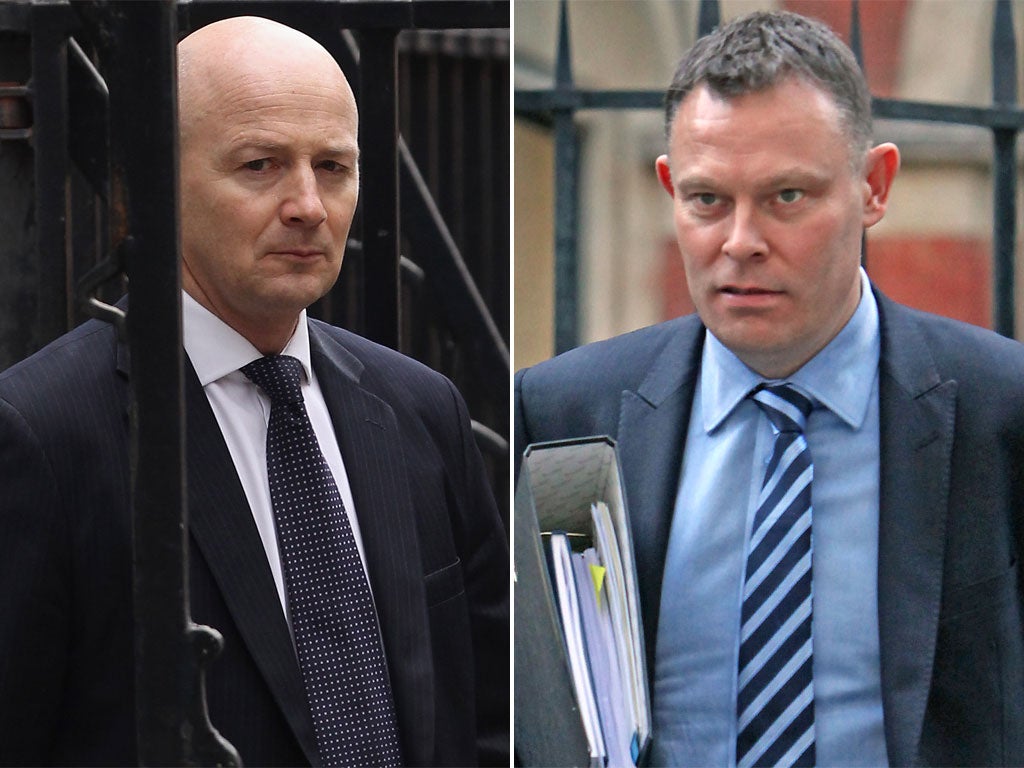Into the lions' den: police 'feared violence at Wapping HQ' when they came looking for hacking evidence
Staff surrounded and photographed officers searching Clive Goodman's desk

News International staff intimidated and obstructed police officers trying to search its Wapping headquarters during the original phone-hacking inquiry in 2006, the Leveson Inquiry heard yesterday.
A group of four police officers who entered the News of the World in an attempt to seize evidence from the desk of the royal editor, Clive Goodman, feared violence would break out in the newsroom as they were surrounded and photographed by News International staff, a senior officer said.
The officers backed down and left without all the evidence they wanted, later prosecuting just Mr Goodman and the NOTW's private investigator Glenn Mulcaire, despite having found a mass of evidence in Mr Mulcaire's notes indicating wider staff involvement.
The angry reception that greeted the police when they visited Wapping on 8 August 2006 – the same day that they raided Mr Goodman's home in Putney – emerged in a day of extraordinary disclosures about the failed police investigation at the Leveson Inquiry, which has begun examining the relationship between the press and police.
Detective Chief Inspector Keith Surtees, investigating officer for the first hacking inquiry, Operation Caryatid, said there was "real difficulty" carrying out the search, with only four officers allowed into the building.
He said: "My officers were confronted with photographers summonsed from other parts of News International and were taking photographs of the officers. A number of news editors challenged the officers around the legality of their entry. They were asked to go to a conference room until lawyers could arrive to challenge the legality."
Det Chief Insp Surtees said the officer leading the search described it as a "tense stand-off", adding: "Our officers were effectively surrounded and photographed and not assisted in any way, shape or form...The search did not go to the extent I wanted it to."
His officers were concerned that NOTW staff could "offer some form of violence" against the small police team. Asked why police did not return to Wapping another time, he said: "I think the moment had been lost with regards to the information we sought."
The Metropolitan Police failed to investigate the considerable evidence in Mr Mulcaire's notebooks that other NOTW journalists had commissioned eavesdropping of voicemails. Giving evidence, Det Chief Superintendent Philip Williams, the officer operationally in charge of Operation Caryatid, admitted the police knew that hundreds of people might have been hacked.
In 2006, Scotland Yard documentation referred to there being at least 418 potential victims, including John Prescott, then the Deputy Prime Minister – whom Scotland Yard later insisted was not a victim – but the police told the Crown Prosecution Service the number was only around 200.
Det Chief Supt Williams decided not to contact any of the other names of journalists in Mr Mulcaire's "corner notes", where the private investigator listed who commissioned him. "I knew there were a range of [corner] names," Det Chief Supt Williams explained. "'Clive' would obviously be Clive Goodman...with other names I didn't necessarily know that they were from the News of the World. They could be from any organisation." When the CPS asked the police whether there were "corner names" indicating the involvement of other NOTW journalists, it was told there was "none" and that it was never presented with any such evidence, disclosed the inquiry's QC, Robert Jay. He asked Det Chief Supt Williams why he did not use the Mulcaire evidence and "common sense" to dig further into the involvement of other journalists.
Det Chief Supt Williams said that the SO13, the Anti-Terrorist Branch unit, was more concerned with terrorism after the July 2005 London bombings and that in September or October 2006, his commanding officer, Deputy Assistant Commissioner Peter Clarke, decided not to expand the case.
Mark Lewis, the lawyer who had pursued the scandal, said: "It's extraordinary that in 2012 the police have finally said that News International obstructed the execution of a search warrant in 2006 and that a police officer feared the obstruction caused him to fear that evidence would be detroyed and that the individual officers feared violence."
Brooks' phone was hacked by staff
Rebekah Brooks's phone was hacked twice a week by colleagues at the News of the World while she was editing The Sun, the Leveson Inquiry heard yesterday.
Scotland Yard invited her to join its 2006 prosecution of a journalist and private detective working for the Sunday tabloid as a potential victim of illegal interception of voicemails.
Ms Brooks, who was herself a former editor of the NOTW, which is The Sun's sister paper, did not take up the offer.
She instead passed on information about the hacking investigation she gleaned from the police to NOTW's lawyers.
Ms Brooks became chief executive of parent company News International in 2009.
... but her backers ride to her rescue
Rupert Murdoch rode to the defence of Rebekah Brooks yesterday, complaining on Twitter that his former protégée is being criticised for "saving an old horse from the glue factory".
And Ms Brooks' husband, the racehorse trainer Charlie Brooks, hit back at the Metropolitan Police's suggestions that Raisa, the retired police horse loaned to Ms Brooks, had been returned in "poor" condition. Mr Brooks said: "I know more about caring for them than people at the [Met]."
Subscribe to Independent Premium to bookmark this article
Want to bookmark your favourite articles and stories to read or reference later? Start your Independent Premium subscription today.
